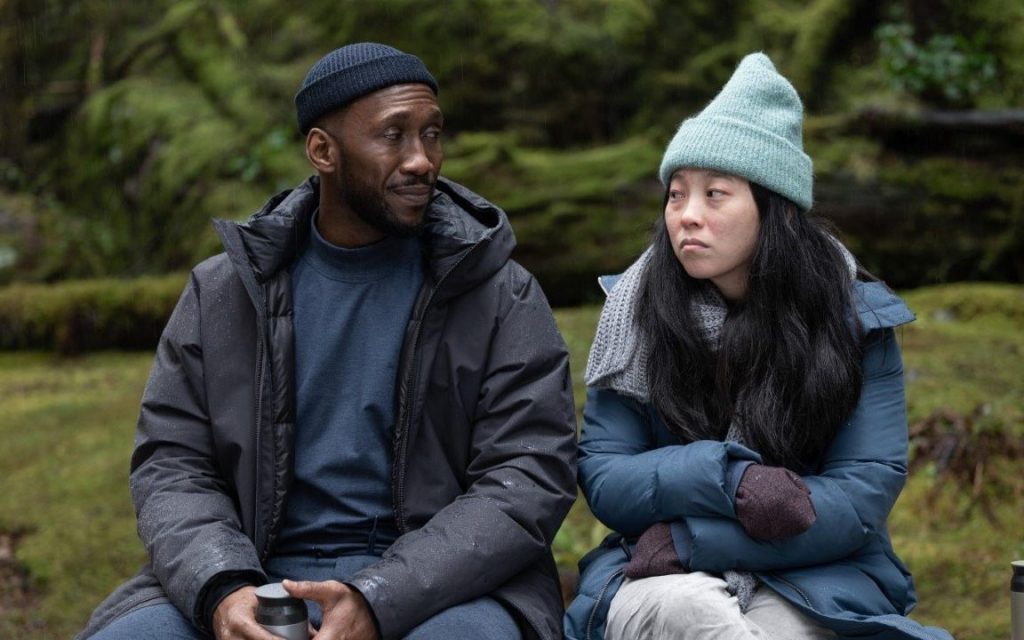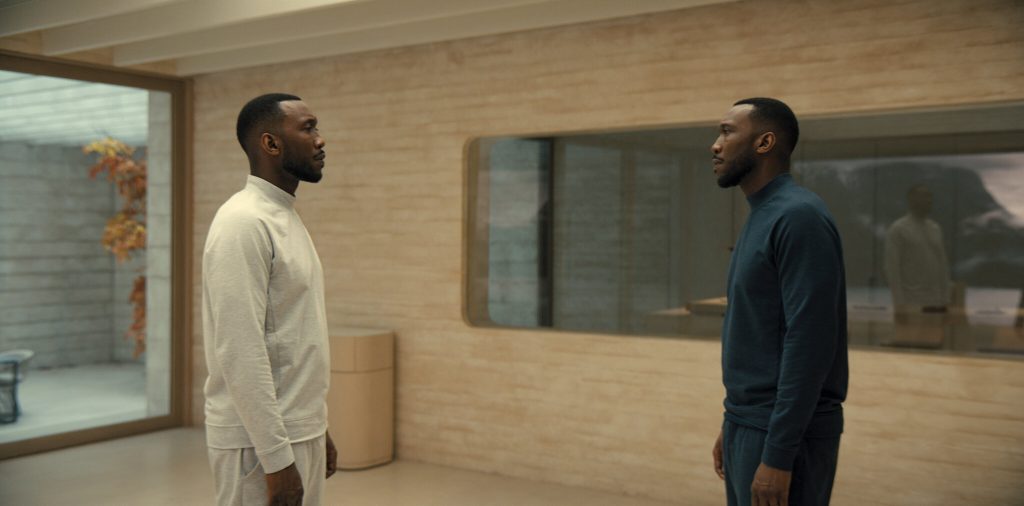By Lynn Venhaus
Sometime in the future, Cameron (Mahershala Ali), diagnosed with a terminal illness, contemplates an alternative solution by his doctor (Glenn Close) – a clone will take his place, sparing his wife Poppy (Naomie Harris) and his young son Cory (Dax Rey at 8) the grief of his loss. They must not discover the deception. In this heavy — and heavy-handed “Swan Song,” altering their fate has consequences. Can he let go, and how much can we sacrifice in such cases?
With its daring premise and showing the technology to back up messing with fate, “Swan Song” takes us on an unusual journey. However, without two-time Oscar winner Mahershala Ali delivering a heart-wrenching performance – and this time in a dual role, this film would be a slow-moving ‘what if?’ storyline without much to recommend.
Writer-director Benjamin Cleary, who won an Oscar for his short “Stutterer” in 2015, raises ethical questions but fumbles by not fully develop any answers, or explain certain aspects about the likelihood of technology overreach and those inherent implications. Playing God has its costs. (And shouldn’t we know this?)
The tone is all over the place. It’s cold and clinical with a lot of fancy high-tech, slick 3-D graphics (Cam is a graphic designer) and sterile surroundings, but then it’s warm and fuzzy when depicting happy family scenes.
Dax Rey, as 8-year-old cute-as-a-button Cory, melts your heart during the time he spends with his father. As his wife Poppy, Naomie Harris has terrific chemistry with Ali – they were both Oscar-nominated for their performances in “Moonlight,” with Ali winning Best Supporting Actor in 2017. He won two years later for “Green Book.”
That trio’s emotional earnestness goes a long way in softening such disconcerting material. But it’s not enough to overcome what is, for the most part, a dull slog.

The small ensemble includes Awkwafina as a glum participant in the experiment who becomes friends with Cam.
The replica, who has been programmed with all of Cam’s memories, emotions, and experiences, is groomed to take over and will assume his place in the family. Two weeks after that, everything will seem normal – like there was no replacement and the clone won’t think he is a clone.
Some of the movie’s puzzling elements include not explaining his illness, and it’s just weird that the doctors have a compound where the dying live out their final days without their loved ones, who will never know about the secret experiments.
With any loss, not being able to say goodbye is always a regret. Therefore, this seems cruel, not helpful. Are we saying loss is too painful so let’s live a lie so that others, oblivious, will live longer happily ever after (up to a point).
Isn’t death an inevitable part of life? How we cope is key to the human experience.
Here, Ali’s Cam is jealous of the clone – and suspicious, and it’s all gone too smooth, except for him getting testy about the clone’s ease in assimilating into his former life. One of the reasons he wants to shield his wife is that her twin brother had died a year earlier, and she fell into a deep depression over his death.
These kinds of scientific fiction films are always trippy mind-benders, only this one happens to be just ‘meh.” We need more of a satisfying story to understand and accept it.
“Swan Song” appears incomplete, leaving out crucial details and then ending abruptly. Nevertheless, Ali has become one of our most reliable and exciting actors, so his performance is a standout in an otherwise tepid film.
“Swan Song” is a 2021 sci-fi drama written and directed by Benjamin Cleary. It stars Mahershala Ali, Naomie Harris, Glenn Close, Awkwafina and Dax Rey and is rated R for heated language. In select theaters and streaming on Apple TV+ starting Dec. 17. Lynn’s Grade: C


Lynn (Zipfel) Venhaus has had a continuous byline in St. Louis metro region publications since 1978. She writes features and news for Belleville News-Democrat and contributes to St. Louis magazine and other publications.
She is a Rotten Tomatoes-approved film critic, currently reviews films for Webster-Kirkwood Times and KTRS Radio, covers entertainment for PopLifeSTL.com and co-hosts podcast PopLifeSTL.com…Presents.
She is a member of Critics Choice Association, where she serves on the women’s and marketing committees; Alliance of Women Film Journalists; and on the board of the St. Louis Film Critics Association. She is a founding and board member of the St. Louis Theater Circle.
She is retired from teaching journalism/media as an adjunct college instructor.

